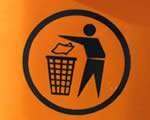 Go to main content
Go to main content
Archive Website of the UK government
Please note that this website has a UK government accesskeys system.
Main menu
Page menu
Environment and greener living

Recycling batteries
In the UK, only about three to five per cent of all household batteries are recycled. Many old batteries end up in landfill, where they can leak harmful chemicals into the soil. You can help tackle this problem by recycling your batteries.
Where to recycle household batteries

Most supermarkets and shops that sell batteries now have collection bins for used batteries. Some town halls, libraries or schools may also set up collection points. Look out for the Be Positive signs, or similar signs, in shop windows and in stores to find these collection points.
Several local councils already collect batteries in the doorstep recycling collection, or provide bins at the local waste and recycling centre. Check with your local council to find out what battery recycling choices are available in your area.
For more details about battery recycling, and the new laws, visit the website of the Department for Environment, Food and Rural Affairs (Defra).
If you want to report a shop for not having a battery recycling bin, contact the Vehicle Certification Agency (VCA), who police the scheme.
Examples of household batteries you can recycle
Many of the items you regularly use at home will be run on batteries. Batteries from all of the following items, and many others, can be recycled:
- mobile phones
- laptops
- hearing aids
- watches
- portable cameras
- cordless power tools
- torches
- electric toothbrushes
- razors
- hand-held vacuum cleaners
Why recycle household batteries?
Some household batteries contain chemicals like lead, mercury or cadmium. If batteries are thrown into your normal rubbish bin, they are likely to end up in landfill. Once buried, the batteries start to break down and can leak some of these chemicals into the ground. This can cause soil and water pollution, which may be a health risk for humans.
Recycling stops batteries going to landfill and helps recover thousands of tonnes of metals, including valuable metals like nickel, cobalt and silver. This reduces the need to mine new materials, cutting CO2 emissions and saving resources.
What happens to the used batteries?
Recycled batteries are first sorted into different types – for example lithium, alkaline, lead cell, mercury button – as each type is recycled differently.
Lead acid batteries (used for car batteries) and mercury button cell batteries (flat, round, silver batteries found in watches) are fully recycled in the UK.
Lithium and alkaline batteries (AA, AAA and 9v batteries) are part-recycled in the UK. They are then sent to plants abroad for the rest of the process.
Other types of battery are sent abroad, as the UK does not currently have plants that can recycle these.
How to recycle car batteries
Waste and recycling site opening times

Find opening times and locations for your local recycling centre
Car batteries are treated as hazardous waste. They must not be thrown away with your household waste. They can be recycled at garages, scrap metal facilities and many local waste and recycling centres.
There is a helpful postcode finder on the RecycleNow website. You can use it to check where to recycle car batteries and all other types of waste.
Disposing of electrical and electronic equipment
Many of the items that use portable batteries can also be recycled. You can recycle these and other old electronic and electrical equipment like TVs, fridges and computers, at your local waste and recycling centre.
 Facebook
Facebook Twitter
Twitter StumbleUpon
StumbleUpon Delicious
Delicious Reddit
Reddit
